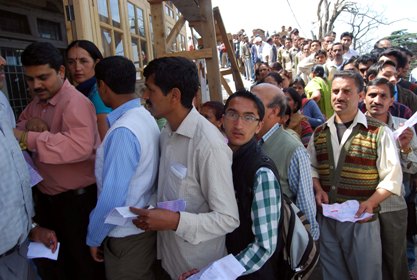Leh, June 30 (IANS) It’s the peak tourist season which young Ladakhis like Jimmy Thinless, a taxi driver, await eagerly to make a decent earning to see through the winter until the next summer. Ironically, tourism, which helps Leh economically, is becoming a matter of concern for the environmentally conscious locals in this picturesque town in Jammu and Kashmir.
“The number of tourists coming to Leh has increased many times over the past few years. For locals like us, this has created more jobs,” Thinless told IANS. “There is development taking place; young men like me work as taxi drivers; some become trekking guides; the number of restaurants and hotels is much more than ever.”
After a slight pause, he adds: “But of late some locals are not very pleased with the rising number of visitors because they (tourists) litter the mountainside and the town area. I drive tourists almost every day to the Chang la Pass (world’s third highest pass at nearly 18,000 feet) and the Pangong lake and it pains me to see wrappers and empty bottles thrown around.”
Agreed Hamida Hussein, a hotel owner in Leh.
“I don’t want to sound hypocritical because I earn my bread and butter from tourists. Summer is the peak tourist season and we depend on these four-five months (June to September/October) to live comfortably through the bitter winter. Having said that, it pains me to see the amount of pollution tourism has brought to Leh,” Hussein told IANS.
“The number of taxis and SUVs plying on the narrow roads of Leh and the market area has multiplied, leading to air pollution. There is too much traffic,” she added.
Hussein has a point.
Private tour operators place Leh among the most sought after tourist destination this season, ahead of hill stations like Shimla and Manali, with visitors flying down to Leh or driving through Manali or Srinagar.
Cocooned amid lofty mountains, Leh sits pretty at an altitude of around 11,000 feet. Its serenity, nature’s bounty and picturesque monasteries are enough to attract any holidayer.
In 2012, nearly 180,000 tourists, including 38,000 foreigners, flooded Leh.
As a result of its growing popularity, Leh has seen a spurt of hotels and guesthouses. Locals feel that water shortage, which was non-existent until recently, has manifested because of the growing number of hotels.
Muhammad Hidayatullah, a craftsman who has a tiny shop in the main market in Leh, said homes get water for just one hour every morning at 7 a.m.
“With that water you cook, bathe, wash clothes, do all that you can. The hotels, which are increasing in number every year, have their own water supply, but we feel that overuse (of water) is adding pressure on us.”
Rigzin Thinless, who works in an NGO that spreads awareness on environmental issues, gives an example of the flipside of modernisation.
“The amount of water used with a single flush in the toilet is 15 litres, an amount that a common man cannot imagine about using in a single activity. Using the shower again consumes a lot of water. To battle the water shortage, which was unheard of earlier, hotels are resorting to reckless digging of borewells. As a result the groundwater table is declining.”
Some hotels are strict about water usage.
“Efforts are on to tackle the problems, both at the administrative level and by people themselves,” Thinless said.
Since last year, the Ladakh Autonomous Hill Development Council (LAHDC) has made it mandatory for tourists to pay an environmental fee to maintain the ecology of the region and to sensitise them about the environment. There are also signages everywhere reminding people about the fragile ecology of the place and requesting them not to throw litter carelessly.
“It’s important that the ecology is not spoiled because of tourists,” commented Ragini Jacob, a trekker from Karnataka. Her friend Maria Joseph added: “If needed, there should be a cap to the number of vehicles plying on the roads or visitors. Responsible tourism is the call of the hour.”
(Azera Parveen Rahman can be contacted at [email protected])
The opinions, beliefs and viewpoints expressed by authors, news service providers on this page do not necessarily reflect the opinions, beliefs and viewpoints of Hill Post. Any views or opinions are not intended to malign any religion, ethnic group, club, organization, company, or individual.
Hill Post makes no representations as to the accuracy or completeness of any information on this site page.


